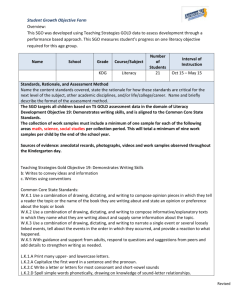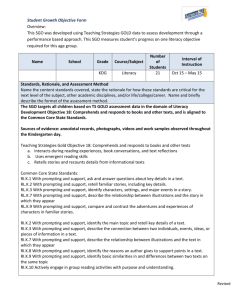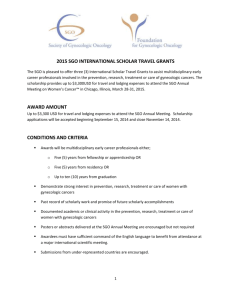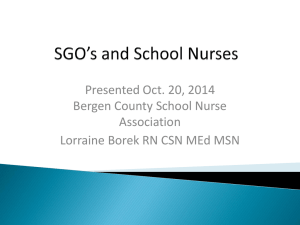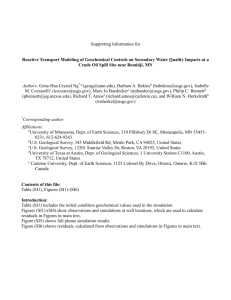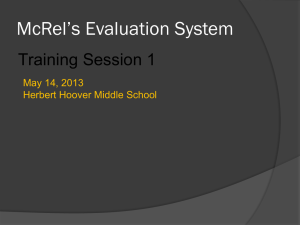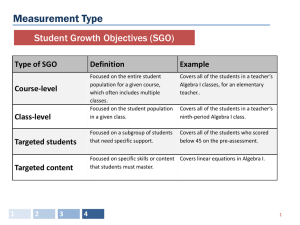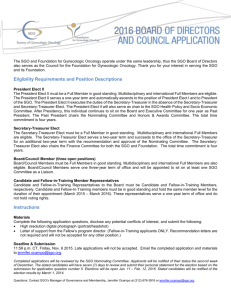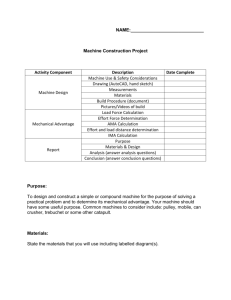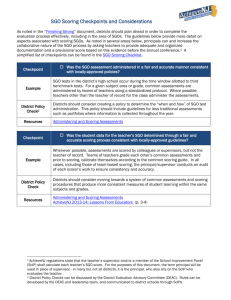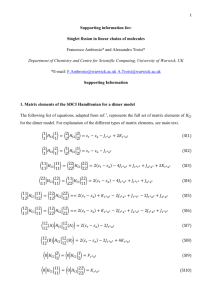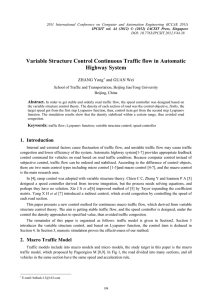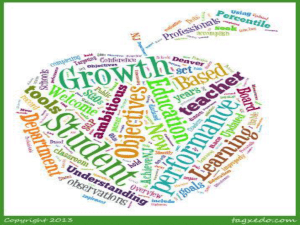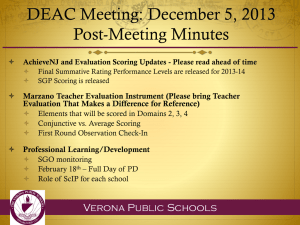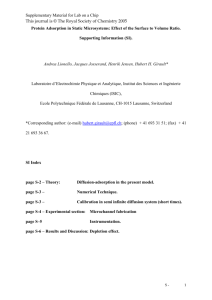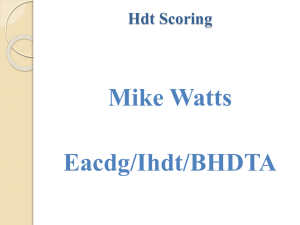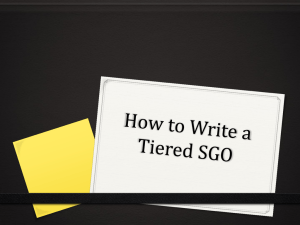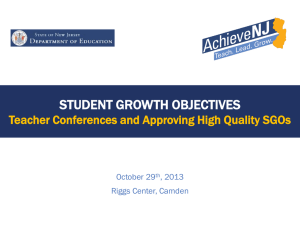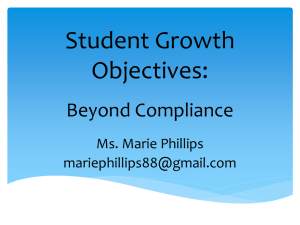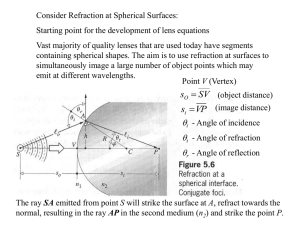Preparing for End of Year Evaluations
advertisement
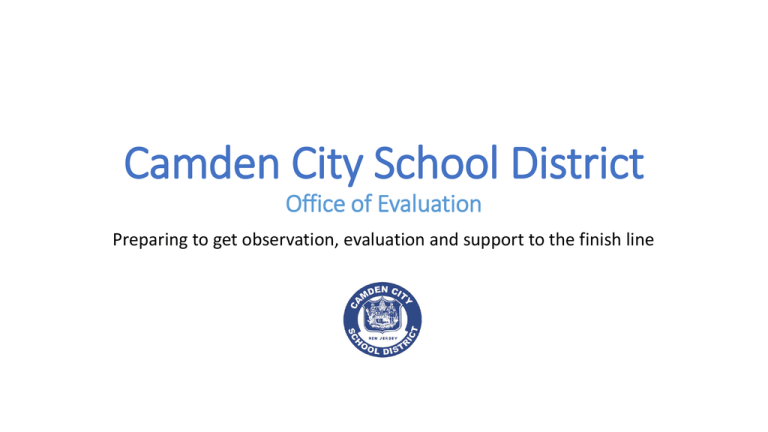
Camden City School District Office of Evaluation Preparing to get observation, evaluation and support to the finish line Office of Evaluation Agenda • Overview of the SGO Scoring Process • Preparing for Conversations about Student Growth • Questions SGO Scoring Process Team Actions 1. Conduct End of Year Testing: Teachers and building leaders work together to administer end of year assessments (MAP/DRA/SMI/Subject-specific/etc…) 2. Prepare Data: Teacher, coaches, school leaders prepare data for analysis Teacher Actions 1. Self - Score SGO: Teacher scores their SGO 2. Submit SGO: Teacher attaches Scored SGO and relevant data in Teachscape. Provides assessment used if not Math/ELA Lead Evaluator Actions 1. Score SGO: Lead evaluator reviews data and SGO, inputs score into Teachscape • If changing score – lead evaluator must document reason with evidence • If confirming score – lead evaluator can simply cite evidence provided 2. Inform Conversation: Use data to focus conversation on student outcomes 1. End of Year Assessments • K – 8 DRA Testing: should all be administered, completed, and scored by April 15. Scores submitted to On-Course by April 30. • K – 1 enVisionMATH End of Year Test: should all be administered, completed, and scored by Friday, May 23. • 2 – 5 SMI Testing: May be started as early as Monday April 14 and must be completed by Friday, May 23. • 6 – 8 MAP Testing: May be started as early as Monday April 14 and must be completed by Friday, May 23. • 9 – 12 MAP Testing: May be started as early as Monday April 28 and must be completed by Friday, May 16. • All Others: Recommended that tests are administered and scored by May 15th where possible. 2. Prepare Data for Scoring • Organize and Analyze: Once teacher has given assessment, they will then need to prepare data in a way that is conducive to analysis and scoring of the SGO. • Math/ELA Teachers: For MAP/SMI/DRA these reports should come in a standardized form. Math, Literacy, and Data Leaders will be prepped to help teachers prepare and interpret these reports. • Other Subject Areas: For other subject areas, we will work with you and your staff to help put this data into a standardized and manageable format. Example: Simplified DRA2 Goal Target Score % of students achieving reading level growth goal Exceptional (4) Full (3 ) Partial (2) Insufficient (1) 85-100% of students will achieve one year’s growth 70-84% of students will achieve one year’s growth 60-69% of students will achieve one year’s growth 0-59% of students will achieve one year’s growth Example: Simplified DRA2 Goal SGO Scoring Guidance Document Teacher Name: Subject Area: 1st Grade Reading Number of Students Assessed: 16 Assessment Used: DRA2 Student Name 1. John H. 2. Sarah Y. 3. Tymir E. 4. Theresa A. 5. Robert A. 6. Aldrick M. 7. Roberta B. 8. Ephraim T. 9. James B. 10. Leslie T. 11. Theresa H. 12. Alex B. 13. Anita H. 14. Chanel M. 15. Nikki A. 16. Tara M. Baseline Data Mid-Year Data End of Year Assessment Target Level Target Achieved? 3 1 3 6 4 8 3 6 4 A 4 6 3 4 4 1 8 2 8 12 10 14 8 12 10 2 10 12 8 10 10 2 14 4 16 18 16 20 14 18 14 4 14 16 12 18 16 4 14 4 14 18 16 20 14 18 16 4 16 18 14 16 16 4 Yes Yes Yes (Exceeded) Yes Yes Yes Yes Yes No Yes No No No Yes (Exceeded) Yes Yes Example: Target Score % of students achieving reading level growth goal th 10 Grade LAL MAP Exceptional (4) 85-100% will achieve one year’s growth (meet or exceed their RIT projection). Full (3 ) 70-84% will achieve one year’s growth (meet or exceed their RIT projection). Partial (2) 60-69% will achieve one year’s growth (meet or exceed their RIT projection). Insufficient (1) 0-59% will achieve one year’s growth (meet or exceed their RIT projection). Example: MAP Report Example: Target Score % of students achieving reading level growth goal th 4 Grade Math Exceptional (4) 85-100% of students will grow one grade level (or be proficient by the end of the year) Full (3 ) 70-84% of students will grow one grade level (or be proficient by the end of the year) Partial (2) 60-69% of students will grow one grade level (or be proficient by the end of the year) Insufficient (1) 0-59% of students will grow one grade level (or be proficient by the end of the year) Example: SMI Data Report Example: Target Score % of students achieving reading level growth goal th 6 Grade History Exceptional (4) 85-100% will either score above 80% on the post test or improve by 30 percentage points from the pre to the post test Full (3) 70-84% of students will either score above 80% on the post test or improve by 30 percentage points from the pretest to the post test Partial (2) 60-69%% of students will either score above 80% on the post test or improve by 30 percentage points from the pretest to the post test Insufficient (1) 0-59% of students will either score above 80% on the post test or improve of by 30 percentage points from the pretest to the post test Example: th 6 Grade History SGO Scoring Guidance Document Teacher Name: Subject Area: 6th grade US History Number of Students Assessed: 14 Assessment Used: Teacher Made Student Name Baseline Data Mid-Year Data End of Year Assessment Target Level John H. 65 85 80 Leslie T. 70 90 80 Theresa H. 40 60 70 Alex B. 35 55 65 Anita H. 40 75 70 Chanel M. 60 95 80 Sarah Y. 40 60 70 Tymir E. 70 90 80 Theresa A. 55 85 80 Robert A. 30 55 60 Aldrick M. 55 75 80 Roberta B. 65 85 80 Ephraim T. 50 80 80 James B. 60 85 80 Target Achieved? Further Guidance and Support 1. Supporting Math/LAL: Turnkey training and support for teachers over the next month about how to interpret data. 2. Supporting Other Subject Areas: Working with Coach evaluators to support outside areas 3. Further Resources: Providing further guidance documents to troubleshoot common questions 4. Individualized Support: Answering any further questions you may have 1 on 1. Office of Evaluation Agenda • Overview of the SGO Scoring Process • Preparing for Conversations about Student Growth • Questions Example: Leading Conversation about Growth Question How many (what percentage) of your students made the growth objective? Why do you think these students made the objective? (Probe for strengths in understanding certain content, effective teaching strategies that were used, formative assessments that provided useful information, etc.) Which students did not meet the growth objective? What content did these students struggle with that prevented them from meeting the objective? What teaching strategies could you use to help students understand this content in the future? Response Example: Leading Conversation about Assessment Question • What Assessment(s) did you use to measure your student’s growth? • What kind of information about your students did this assessment provide? • Would you use this assessment as a measurement for SGOs in the future? If not, what would you use? Response Office of Evaluation Agenda • Overview of the SGO Scoring Process • Preparing for Conversations about Student Growth • Questions
